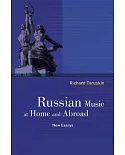This new collection views Russian music through the Greek triad of “the Good, the True, and the Beautiful,” to investigate how the idea of ‘nation’ embeds itself in the public
discourse about music and other arts with results at times invigorating, at times corrupting. In our divided, post cold-war, and now post-9/11 world, Russian music, formerly a quiet corner on
the margins of musicology, has become a site of noisy contention. Taruskin assesses the political and cultural stakes that attach to it in the era of Pussy Riot and renewed international
tensions, before turning to individual cases from the nineteenth century to the present. Much of the volume is devoted to the resolutely cosmopolitan but inveterately Russian Igor
Stravinsky, one of the major forces in the music of the twentieth century, and subject of particular interest to composers and music theorists all over the world. Taruskin here revisits him
for the first time since the 1990s, when everything changed for Russia and its cultural products. Other essays are devoted to the cultural and social policies of the Soviet Union and their
effect on the music produced there as those policies swung away from Communist internationalism to traditional Russian nationalism; to the musicians of the Russian postrevolutionary diaspora;
and to the tension between the compelling artistic quality of works such as Stravinsky’sSacre du Printemps or Prokofieff’s Zdravitsa and the antihumanistic or totalitarian
messages they convey.Russian Music At Home and Abroad addresses these concerns in a personal and critical way, characteristically demonstrating Taruskin’s authority and ability
to bring living history out of the shadows.




